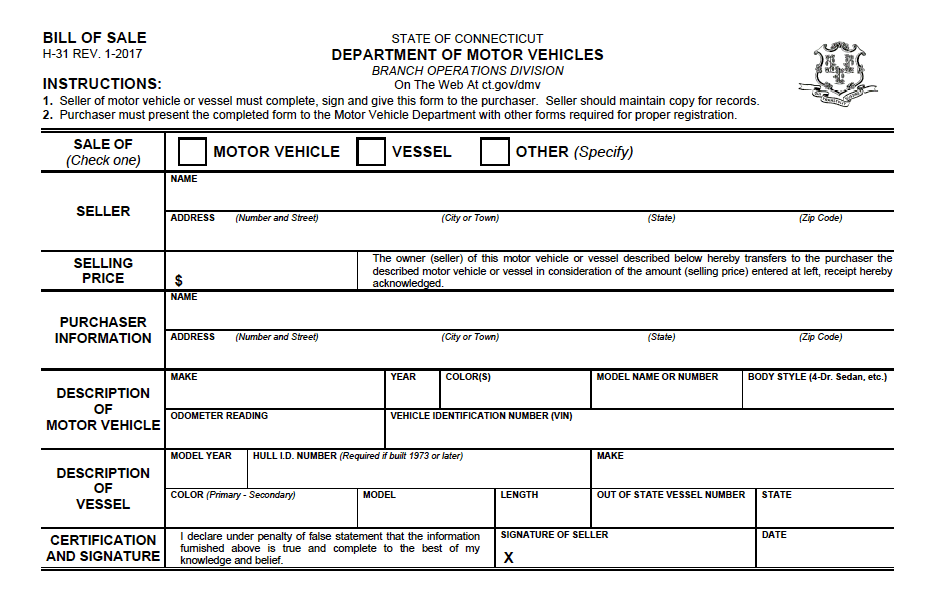Connecticut Trailer Bill of Sale Form
A Connecticut trailer bill of sale form communicates the transfer of a personal use trailer in writing. It defines the seller as the previous owner and the buyer as the new person in charge. The document releases the merchant from liability and declares the buyer as the individual responsible for taking care of the trailer. The purchaser must also follow state laws pertaining to the trailer, such as registration and titling requirements.
What is a Connecticut Trailer Bill of Sale?
A Connecticut trailer bill of sale breaks down the components of a transaction for a utility, boat, snowmobile, or all-terrain vehicle (ATV) trailer. The new owner must possess the signed trailer bill of sale to obtain a registration and title. It must include information about the buyer and seller and the selling price, body style, make, model (year), and vehicle identification number (VIN) of the trailer.
The merchant sells the trailer in “as-is” condition, meaning they do not provide repairs or changes pre- or post- sale. Buyers must ascertain they wish to purchase the trailer, even if it needs mechanical work. It must also meet the standards for use in Connecticut (§ 14-81, § 14-96). If it does not meet the qualifications, law enforcement can stop owners and ticket them. The buyer is responsible for paying the bill and cannot request money from the seller.
How to Register a Trailer (4 Steps)
All trailers require registration. Models weighing over 3,000 pounds (gross weight) and manufactured twenty (20) years ago or less need a title. Residents have sixty (60) days to register after purchasing the trailer or moving to the state. The Connecticut Department of Motor Vehicle (DMV) handles trailer registration and titling.
Step 1 – Compliance Issues
The applicant must use the DMV’s online checker to ensure they do not have conflicts preventing them from registering or titling their trailer.
Individuals with compliance issues must settle claims before registering. Most often, residents have: 1) not paid their property taxes, 2) unresolved parking ticket(s), 3) safety concern reports, 4) failed emissions or did not undergo an inspection, 5) suspensions, or 6) problems with insurance.
Step 2 – Vehicle Identification Number (VIN)
Residents only need a VIN inspection when registering an out-of-state trailer or if they cannot find the number on their trailer. The DMV must provide the trailer owner with a temporary ten (10) day registration for $21, so they can bring it to inspection.
An official VIN verification center must inspect out-of-state trailers. The owner must pay $10 to receive an official inspection form, which they must provide to the DMV during registration or titling.
Individuals who cannot find their VIN on the trailer must visit a DMV inspection lane to verify the number. This process occurs before registration, and the owner must present the number to the registering office.
Step 3 – Attend the Appointment
The DMV requires residents to make an in-person appointment to carry out trailer registration and/or titling. Booking must occur through the state’s online portal.
Registration and titling steps differ according to the type of trailer (i.e., new, used, or homemade) and its unladen weight. New and used trailers weighing under 3,000 pounds require similar documentation. Trailers over 3,000 pounds must have a certificate of origin and title.
Homemade trailers, on the other hand, need additional forms. Builders must provide the receipts for parts and items used, an application (Form H-13B), an affidavit of ownership (Form H-115), and an inspection certificate.
| Bring the Following: |
Step 4 – Renew
The DMV allows trailer owners to renew starting forty-five (45) days before the expiration date and thirty (30) days after. If renewal happens five (5) or more days after the expiration date, the applicant must pay an additional $10 fee. Residents can only renew after settling compliance issues (if any).
Individuals can send the paperwork and payment through the online renewal system or mail. Online renewals require a personal identification number (PIN), first and last name, driver’s license or state ID number, birthday, and Security of State number (organizations only). Mail-in renewals require the applicant to provide the correctly signed, dated, and/or notarized documents to receive approval.
| Mailing Address: |
| Department of Motor Vehicles P.O. Box 150456 Hartford, CT 06115-0456 |
